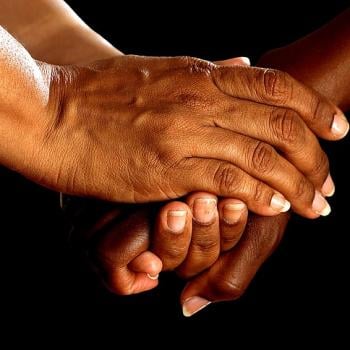A debate, or rather extended and increasingly elaborate discussion, is occurring in some sections of the modern polytheist community. In brief, the "destructive" or "scary" sides of some deities have been questioned, and some have suggested that one might be devoted to this or that deity who has a "dark side" in spite of that dark side. People, including Sannion, Dver, and several others, have suggested they love their deities not in spite of their dark sides, but because of them.
I can't find anything to disagree with in these propositions by some polytheists. And yet, I do see something of use in the notion that one might only see the "brighter side" of some deities in one's relationship with them, not because one is shallow or deficient or anything of the sort, but because those "nicer" aspects are simply the ones that an individual might most respond to or need. There is nothing wrong with this. There is the notion, found in Tibetan Buddhism as well as some other Asian religious philosophies, that one sees either the peaceful or the wrathful sides of a given bodhisattva due to one's own state of mind. If one is peaceful, the bodhisattva appears peaceful. If one's mind and spirit are in conflict, then only a wrathful bodhisattva may be able to get through to the ailing person-and the wrathful figure will not hesitate, if necessary, to cut off an individual's head to reach them if that is what it takes. These wrathful figures, too, are bodhisattvas, beings of infinite compassion, wisdom, and understanding.
This reminds me of my favorite line from a late second-century CE Latin text, Altercatio Hadriani Augusti et Epicteti Philosophi, which asks "What are the gods?" The answer of the pseudo-Epictetus is, "A constellation of eyes; the spirits of understanding. If you fear, they are fearful; if you are temperate, they are sanctified" (my translation).
Not by any stretch of the imagination would I suggest that those who see, enjoy, and revel in the more wrathful sides of their deities are deficient or of a flawed or incomplete understanding; nor, in the pseudo-Epictetus' words, that they are "fearful." Nor, however, would I say that those who only see the benevolent sides of their deities are shallow, ignorant of how the world really works, or are of a flawed or incomplete understanding; nor, are they automatically "temperate" in the pseudo-Epictetus' terms. Different strokes (and sometimes sword-strokes!) for different folks-it's one of the enduring rules of polytheism, and just as I don't think one god is inherently better or more appropriate for any given individual than another, so too do I think that a singular benevolent or wrathful aspect of one deity is better or worse for any given individual. The individual's conscious self, the individual's deepest needs in their soul, and the deity's assessment of which need to address based on the nature of the relationship are the three best gauges for what form of a deity is most useful to appear to someone. I only have enough awareness myself to determine up to two of those three things at any given time; the rest is up to the deity, and far be it for me to attempt to dictate how a deity decides to appear to me, or anyone else.
Most of my experiences of deities have been of the benevolent sort. I've had a great deal of suffering in my life, I know what it is like quite intimately and deeply, and I know that I would prefer not to have to face more suffering in my spiritual life. I've had direct expressions from several deities that they would like to help me alleviate my suffering, or-if nothing else-that they would wish to help me through it. However, I do not go out therefore seeking the "nicer" sides of the deities with whom I have come into relationships through cultus, devotion, and other connections. I find what level and what demeanor is the most comfortable and useful for both of us in the given situation. Almost every deity that I've had shorter or longer contacts with has tended to be of the more peaceful and benevolent sort. I appreciate this; but, I also recognize that they bring with them the potential for something far more terrifying, often in the service of causing some suffering in order to achieve liberation. (There is a line in the Antinoan "Prayer Against Persecution" in this regard: "I give thanks to you for my trials and my triumphs, O Good God!") It makes things interesting, certainly, since in theory they could turn on a dime and come at me with a flaming sword of soul-incineration... but, they have tended not to.
There are, of course, exceptions. For every Kali who comes to me as an aged Indian woman in white and embraces me as a child, laughing with me and weeping with me and calling me her daughter, there's also a Loki who gets my attention by flirting (in a very sexual manner) at the edges of my consciousness, and then gives me dreams of skeletally-thin individuals slowly melting into pools of blood in a theatre full of spectators as if it is a scene they all want to watch, and I am forced to watch along with them. Yes, both of those things happened... and, yet, though I don't know him very well at this point, I still do like Loki for appearing in this way as much as I like Kali for appearing to me as she did! And, for those who have experience of these matters, it is never particularly fun nor easy to encounter Typhon, not only because of how ferocious he is by nature, but because of how pained he is in his punishment. Though I am not perfect, I find it possible within myself to feel compassion even for a being who set out to overthrow the very order of the universe itself. But what all of these encounters share in common with all of the most beautiful and beatific encounters I've had with other deities is that all of them are convulsively powerful-to even be in the presence of a god and to have them in one's sensual or extra-sensual perceptions is to have the very medium of those perceptions stretched to near-breaking point. While I am not yet blind, deaf, or completely insane from having seen, heard, and felt such things, one can easily understand how such results might occur as a result of prolonged exposure. And yet, I persist in my devotions....





